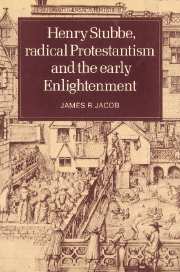Book contents
- Frontmatter
- Contents
- Miscellaneous Frontmatter
- Preface
- Introduction: the historiographical problem
- 1 Hobbesian Independent
- 2 Republican Independent
- 3 Surreptitious naturalism: the invention of a new rhetoric
- 4 ‘Mahometan Christianity’: Stubbe's secular historicism
- 5 Aristotle on the ale-benches
- 6 Court pen: ‘ancient prudence’ and royal policy
- 7 Court to country
- 8 Civil religion and radical politics: Stubbe to Toland
- Epilogue: the paganizing thread
- Notes
- Bibliographical Note
- Index
6 - Court pen: ‘ancient prudence’ and royal policy
Published online by Cambridge University Press: 14 October 2009
- Frontmatter
- Contents
- Miscellaneous Frontmatter
- Preface
- Introduction: the historiographical problem
- 1 Hobbesian Independent
- 2 Republican Independent
- 3 Surreptitious naturalism: the invention of a new rhetoric
- 4 ‘Mahometan Christianity’: Stubbe's secular historicism
- 5 Aristotle on the ale-benches
- 6 Court pen: ‘ancient prudence’ and royal policy
- 7 Court to country
- 8 Civil religion and radical politics: Stubbe to Toland
- Epilogue: the paganizing thread
- Notes
- Bibliographical Note
- Index
Summary
So although the designs both at home and abroad for altering our religion, would be very little formidable to a well-founded government; yet in such an one as we have now, it will require all our care to obviate such machinations. Another reason is the little zeal that is left amongst the ordinary Protestants: which zeal uses to be a great instrument of preserving the religion established; as it was here in Queen Elizabeth's time.
Henry Neville, Plato RedivivusUp to 1672 we have watched Stubbe continue to write and publish views subversive of church and crown. In his contest with the Royal Society he saw parliament as the protector of popular liberty against the incursions of court-sponsored institutions like the Society. He even looked to parliament as the potential champion of his assault on the Society. So, if anything, his opinions might be identified with the country opposition to the court. Certainly the king, we know, was displeased with Stubbe because of his attacks on the Society, and we find Stubbe, in the midst of those attacks, writing a letter to Lord Arlington, begging him not to terminate his patronage because of them. In that letter Stubbe presents himself as the loyal defender of church and crown against their real enemy, namely, the Royal Society. Here was yet another case of Stubbe's rhetorical duplicity because it was in fact the other way around.
- Type
- Chapter
- Information
- Henry Stubbe, Radical Protestantism and the Early Enlightenment , pp. 109 - 128Publisher: Cambridge University PressPrint publication year: 1983
- 1
- Cited by



